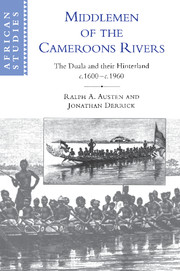Book contents
- Frontmatter
- Contents
- List of tables
- Preface
- List of abbreviations
- Map
- 1 Introduction
- 2 From fishermen to middlemen: the Duala inland and on the coast in the formative period, c. 1600–1830
- 3 Hegemony without control: the Duala, Europeans and the Littoral hinterland in the era of legitimate/free trade, c. 1830–1884
- 4 Mythic transformation and historical continuity: Duala middlemen and German colonial rule, 1884–1914
- 5 Middlemen as ethnic elite: the Duala under French mandate rule, 1914–1941
- 6 Between colonialism and radical nationalism: middlemen in the era of decolonization, c. 1941–c. 1960
- Notes
- Bibliography
- Index
- OTHER BOOKS IN THE SERIES
5 - Middlemen as ethnic elite: the Duala under French mandate rule, 1914–1941
Published online by Cambridge University Press: 08 August 2009
- Frontmatter
- Contents
- List of tables
- Preface
- List of abbreviations
- Map
- 1 Introduction
- 2 From fishermen to middlemen: the Duala inland and on the coast in the formative period, c. 1600–1830
- 3 Hegemony without control: the Duala, Europeans and the Littoral hinterland in the era of legitimate/free trade, c. 1830–1884
- 4 Mythic transformation and historical continuity: Duala middlemen and German colonial rule, 1884–1914
- 5 Middlemen as ethnic elite: the Duala under French mandate rule, 1914–1941
- 6 Between colonialism and radical nationalism: middlemen in the era of decolonization, c. 1941–c. 1960
- Notes
- Bibliography
- Index
- OTHER BOOKS IN THE SERIES
Summary
On September 27, 1914 – exactly seven weeks after the execution of Duala Manga Bell – the Germans surrendered Douala to Allied forces and began withdrawing their forces from the entire Littoral. The Duala now moved from the “mythic” to the more “normal” phase of their colonial experience in which the expatriate rulers would be the same authorities responsible for the neighboring territories of French Equatorial Africa.
Normalization in this instance refers not only to the nationality of the Europeans in control but also the integration of what had for centuries been a coastal entrepot enclave into a fully Cameroonian political and economic regime, with its capital in the interior at Yaoundé. In formal political terms, the Duala now became marginalized: local chiefs had no authority over the rest of the Littoral and what little power they enjoyed within Douala was again divided between Akwa and Bell. Political struggles would continue to be waged at least through the early 1930s around two issues directly inherited from the German past: the mandate status of Cameroon (theoretically administered by France for the League of Nations); and the expropriated Bell land. Battles over these questions were fought with funds earned from a continuation of Duala enterprise in trade and particularly in cash-crop agriculture.
- Type
- Chapter
- Information
- Middlemen of the Cameroons RiversThe Duala and their Hinterland, c.1600–c.1960, pp. 138 - 175Publisher: Cambridge University PressPrint publication year: 1999



